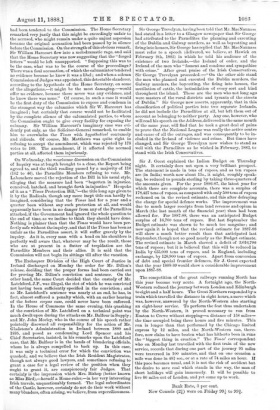The Exchequer Division of the High Court of Justice in
Ireland discharged on Monday the order for Mr. Dillon's release, deciding that the proper forms had been carried out for proving Mr. Dillon's conviction and sentence. On the other hand, the same Court decided that the custody of Mr. Latchford, J.P., was illegal, the riot of which he was convicted not having been sufficiently specified in the conviction ; and as Mr. Latchford's sentence was nearly at an end, he has, in fact, almost suffered a penalty which, with an earlier hearing of the habeas corpus case, could never have been enforced. In the House of Commons the same evening, this quashing of the conviction of Mr. Latchford on a technical point was much dwelt upon during the attacks on Mr. Balfour in Supply ; and Mr. John Morley, who in the course of his speech rather pointedly disowned all responsibility for the action of Mr. Gladstone's Administration in Ireland between 1880 and 1885, and posed as condemning Lord Spencer and his Chief Secretaries, insisted, in his remarks upon the Latchford case, that Mr. Balfour is in the hands of blundering officials, whom he is always compelled to back up. In this case, it was only a technical error for which the conviction was quashed; and we believe that the Irish Resident Magistrates, though not always good lawyers, and sometimes refusing to grant a case for a legal review of the position when they ought to grant it, are conspicuously fair Judges. That certainly is the impression which Mrs. Bishop (better known as Miss Bird),—herself a Home-ruler,—in her very interesting Irish travels, unquestionably formed. The legal subordinates of the Castle, however, certainly do not do their work without ninny blunders, often arising, we believe, from superciliousness.


































 Previous page
Previous page